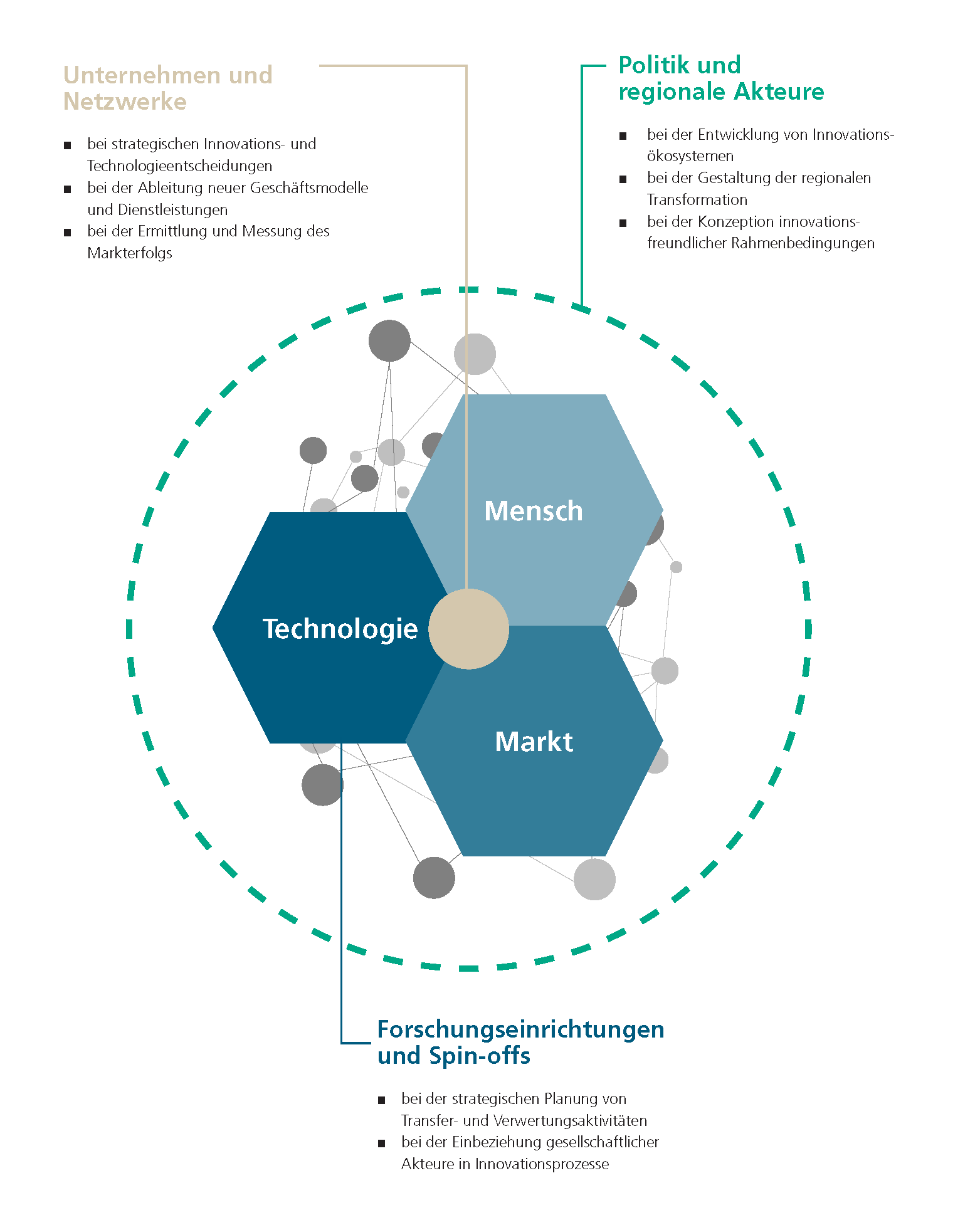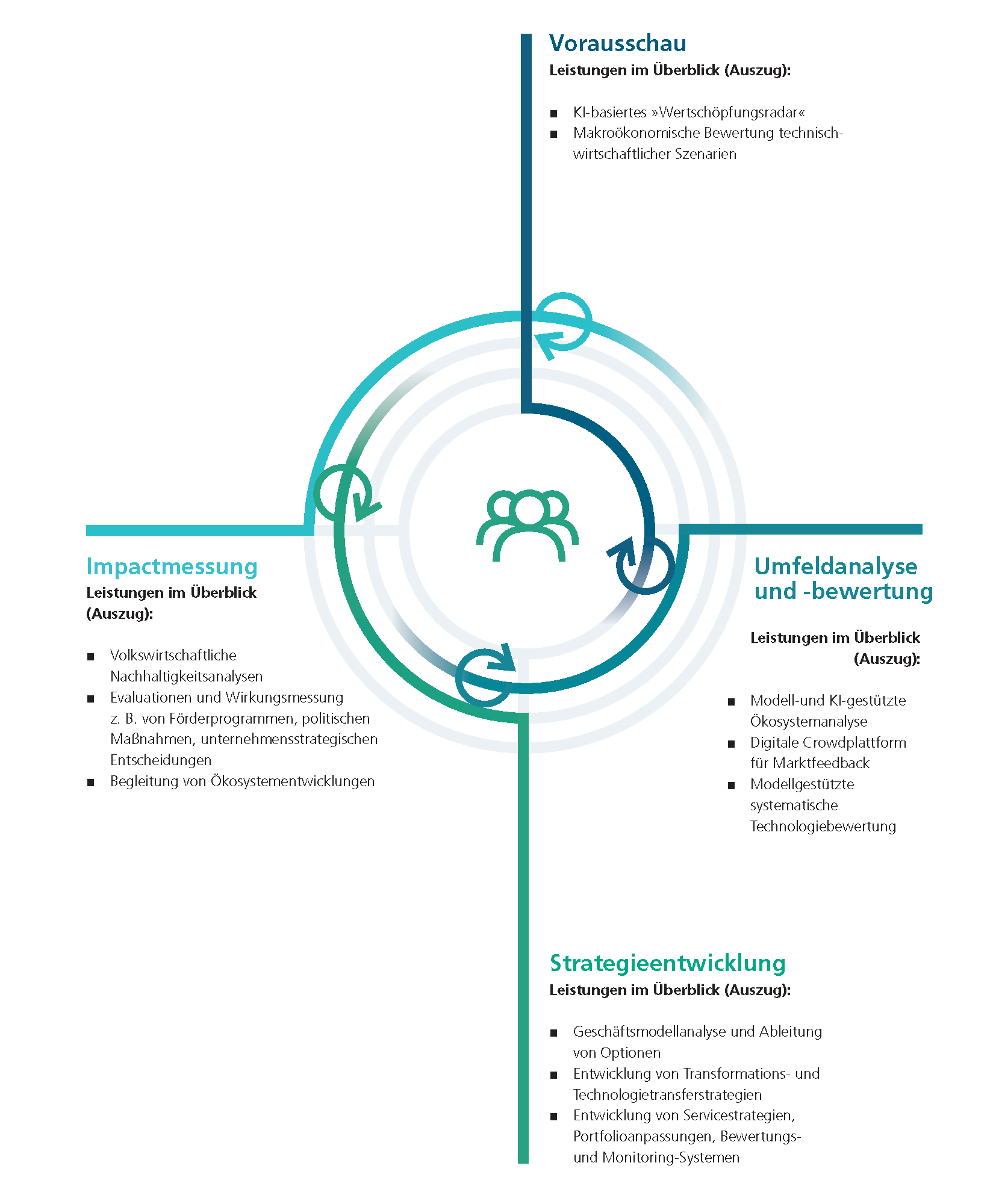Fields of research at Fraunhofer IMW
Accelerated and system-compatible innovations are indispensable in order to actively shape the numerous, necessary transformation processes in the economy and society in both Germany and Europe against the backdrop of increasing international competition. It is essential to shorten the time-to-market of new knowledge and innovative technologies and to reduce risks in the innovation process as early as possible.
With its research focus on innovations in knowledge and technology transfer to accelerate innovation processes and reduce innovation risks, Fraunhofer IMW holds a unique position in the German research landscape. The combination of its competence in economics and social sciences together with its interface competence to computer science, engineering and natural science disciplines as well as its distinctive international orientation are unique within the Fraunhofer-Gesellschaft. The following areas are supported by Fraunhofer IMW:

The research work at Fraunhofer IMW can be divided into four research fields, which are prototypical for a fast, risk-reduced and holistic innovation process. The research divisions underpin the institute's research fields with their specific focus and portfolio of expertise:
1. Foresight: Fraunhofer IMW supports its clients in identifying major technological, economic and societal changes at an early stage and assessing their potential impact. To this end, we are developing, among other things, an artifical intelligence-based tool for the foresight of value creation developments and a macroeconomic model for the analysis of technical and economic scenarios.
2. Environmental analysis and assessment: The institute enables its clients to assess current and future environmental conditions with regard to markets, technologies, scientific and regional potentials and to draw conclusions for possible courses of action. To do this, the researchers use models and web applications for AI-based ecosystem analysis and models for systematic technology assessment, as well as an in-house digital crowd platform for market feedback.
3. Strategy development: The scientists derive concrete options for future value generation and the strategic approach for their customers. Among other things, Fraunhofer IMW supports the development of new data-based services and the associated adaptation of service strategies, portfolio, evaluation and monitoring systems.
4. Impact measurement: Fraunhofer IMW supports its clients in evaluating and, if necessary, adapting their corporate, innovation, technology or transfer strategy in order to reach the desired goals more effectively. In this context, the researchers support the development of ecosystems, such as in the field of quantum computing, or develop economic models for regionalized macroeconomic sustainability analyses.

To research these scientific fields, the institute is divided into four research depdivisions ("Knowledge and Technology Transfer", "Corporate Development in International Competition", "Regional Transformation and Innovation Policy", "Technology Economics and Management"). Furthermore, the additional unit "Data and Platform Based Value Creation" has emerged from a large project funded by the Free State of Saxony. The divisions each consist of two or three research units, which develop their own scientific competencies and research strategies.
The institute develops its scientific expertise and methodological competence based on the scientific qualifications of its employees and within the framework of (preliminary) research financed with institutional basic funding, Fraunhofer-internal programs and, wherever possible, public projects. Using these competencies as a basis, the institute develops its own quantitative and qualitative models or assets, on the basis of which customer-oriented service offerings are designed for different target groups. By doing so, the institute transfers the individual competence of the researchers into institutional knowledge, allows for scaling in the project context and ensures a scientific foundation in each project. At the same time, it ensures differentiation from universities and consultancies and allows value-based pricing, the proceeds of which Fraunhofer IMW in turn uses for research purposes.
The scientific focus and strategy of the institute have changed significantly in its history. For example, Fraunhofer IMW was founded in 2006 as the "Fraunhofer Center for Central and Eastern Europe MOEZ" and has evolved and focused since its name was changed and its content realigned in 2016. In 2021, Fraunhofer IMW entered into a multi-stage, participatory strategy process in order to position the institute's research portfolio for the market and the future as well as to create the necessary framework conditions for this.
